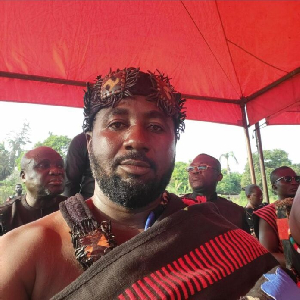Soccer News of Friday, 24 August 2001
Source: USA TODAY
Soccer prodigy Adu won't go to highest bidder
Last spring, when Freddy Adu was 10, he traveled to Italy for a soccer tournament. Although he was seen as a gifted talent, he expected little from the trip.
"Most of my friends thought we would get smashed, just dominated," Adu says.
Instead, Adu led the Americans to the championship and was named MVP.
Italians, usually unimpressed by American soccer, noticed. Scouts for teams such as Inter Milan, the New York Yankees of world soccer, started handing Adu's coaches business cards. From then on, everything changed.

Adu, now 12 and 5-foot-6, knows he's talented and that people are interested. He can help his school just by walking onto the field. He can help U.S. soccer. He can make an agent money. His family says Inter Milan already has offered $750,000.
Teams from Europe have called. Media have called. Adidas approached Adu about testing equipment, and the U.S. Soccer Federation wants Adu to train at the Soccer Academy in Florida run by sports agency, IMG.
Adu has just one answer: No.
"His mother is so puzzled by all of this," says family friend Arnold Tarzy, a financial planner, who fields calls for the Adus. "She keeps asking me, 'What's wrong with these people? He's only 12. I will not sell my son.' "
No one seems to get the message, says Freddy's mother, Emelia Adu.
"I get calls from people in England and Italy, and people back in my home country (Ghana) who said they would take care of Freddy if he leaves," Emelia says. "People tell me they can take care of me. I just want him here with me."
Emelia works 70 hours a week at two jobs. She tests computer boards for Hughes Network System and is a cashier at The Home Depot. The money would help, says Emelia, a single mother who is raising Freddy and his brother Fredua, 10. But it's not worth it.
"He is just too young," Emelia says. "I want him to get an education.

Adu fields offers
In the USA, where soccer is practically a foreign language, it's hard to believe a 12-year-old could cause such a commotion.
But in Europe, where soccer is king, top teams often sign young players like Adu. If a player doesn't pan out, the team transfers him to a lower level. If the player is a star, then the team signed him before his price soared.
Initially, after Freddy played in his first tournament in Italy, Inter Milan representatives discussed a contract for Adu, Tarzy says. They offered $15,000 a year for 5 years. Tarzy said no, and they offered $250,000. Again, Tarzy rejected the offer. The Adu family says Inter Milan later offered $750,000, but no one from the family could recall the names of the Inter Milan representatives.
Inter Milan representatives say the team is interested in Freddy but deny that they offered $750,000.
Such offers don't shock those in the soccer world, but they are surprised at how much teams will spend on kids.
"The money over there gets to be so crazy," says Manny Schellscheidt, a regional coach for the U.S. Soccer Federation who has worked with Freddy. "But these teams are not stupid. They will always get their money back."
One thing is certain: In this system, a player is considered team property.
"This is a kind of slavery, only they're getting paid well," Schellscheidt says. "I'm not sure a young kid should be subjected to that."
Family finds benefactor
Freddy was born in Tema, Ghana, a city known for two things: fishing and soccer. While Emelia ran a convenience store, Freddy often played. When he was 6, older kids started letting him play with them.
"Some of these guys were men," Freddy said. "They were really big."
In November 1997, when Freddy was 8, Emelia decided to immigrate to the United States, moving to Maryland near family.
One of the first people the Adus met was Tarzy when Freddy played in a tournament with the Cougars, a team in the Potomac Soccer Association.
"My team never lost," says Tarzy, who coached a team that played against Freddy that day. "But we lost 2-1 and Freddy had both goals. Nobody had an answer for him. I couldn't sleep that night. I had to track this kid down."
Tarzy realized how special a talent Freddy was and wanted to help him, he says. He bought him new cleats to replace a borrowed, too-small pair the boy was wearing and would drive Freddy to games when his mother was working.
Tarzy says he has nothing to gain financially from the relationship.
I'm in a position where I have done well already," Tarzy says. "I have never looked to profit in any way from Freddy. My only interest is that he doesn't end up being one of those sad, exploited children."
"He helps me with so much," Emelia says. "And I don't have time to handle everything."
Not long after Tarzy saw Freddy play that first game, Freddy officially joined the Cougars. Then he enrolled in The Heights, a private boys school with about 460 students in Potomac, Md. Tuition is $11,700 but was waived for Freddy and his brother. About 30% of the students are offered need-based scholarships (the school does not provide athletic scholarships). Everything from tuition to books is covered for Freddy and Fredua.
Both Freddy and Fredua have done well enough to skip a grade. Freddy skipped seventh grade, went through eighth grade and will begin ninth grade this fall. Fredua skipped sixth grade and is entering seventh. Freddy also will play on the school's varsity soccer team.
"I've been coaching for 28 years and have played and coached at every level and I have never seen a kid at such a young age with this much talent," says Jim Escobar, coach at The Heights and of the Cougars. "He's like a chess player who thinks two moves ahead."
Still a kid
Because Freddy has advanced so quickly in school and in soccer he has fielded questions about his age. Some people have told Freddy they believe he could be as old as 16.
"I used to care about that," Freddy says. "I get so much grief from people. Most people say, 'No, he looks older.' "
Freddy's cousin, Nana, pipes in. "People talk about geniuses in school who are young or people who are good musicians and they never question it. But in sports it's different."
Those who know soccer don't seem to care how old Freddy is.
The U.S. Soccer Federation is especially interested in this prot?g?, ever since the organization noticed him a couple of years ago. "I saw him play and after 5 minutes you could see how good he was," says federation coach Juan Carlos Michia. "We had a water break and I told another coach, 'Get his phone number.' He might have saved my coaching life."
Another federation coach, John Ellinger, wants Freddy to train at IMG's soccer academy. If he decides to go, Adu could be at the training camp full time as soon as January, Ellinger says. As a player, Ellinger believes Freddy will fit in fine despite his youth.
Cautions remain. "One of my biggest concerns right now is who will help him make the right decisions?" Michia says. "He's still a kid. I'm a father and I don't think ... well, I believe a 12, 13, 14 or 15-year-old should be with his parents. It's not good to rush."











